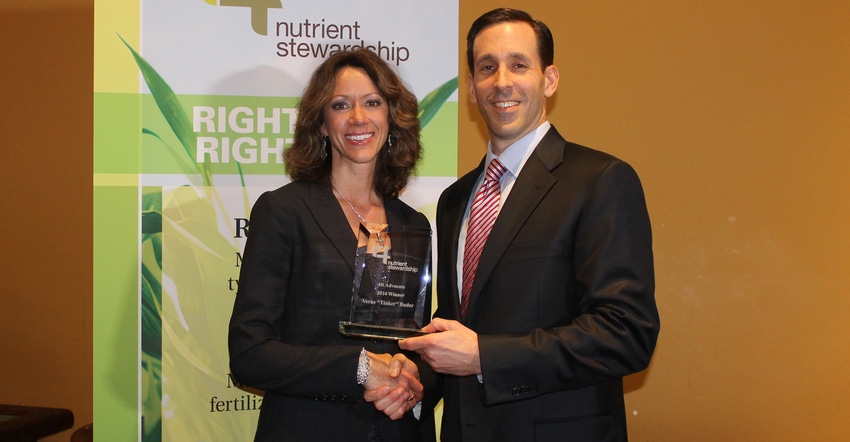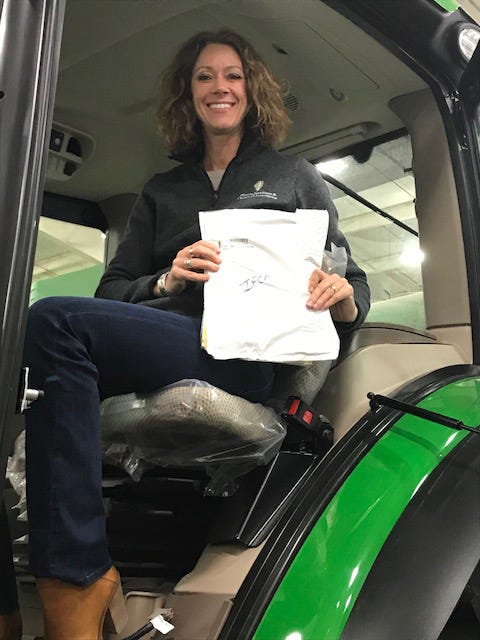
How does a small-town English major with no farm background wind up as president of the Illinois Fertilizer and Chemical Association, simultaneously becoming recognized as one of the premier ag regulatory authorities in Illinois?
Jean Payne laughs at her winding path. “No one in my family farms. I grew up around ag, but not in it, and I certainly never aspired to have a career in ag!”
And yet, here she is — bringing to bear a particular combination of regulatory knowledge and communication skills, from a unique background.
Payne started at a rural high school in Calhoun County, Ill. She majored in English at Illinois State University but decided against becoming an English teacher, and took a job in publishing in downtown Chicago. That was great for a year but not for the long term.
So, she circulated her resume and took a human resources job at Growmark. Before long, she moved into the regulatory area at Growmark and joined an IFCA committee. When IFCA’s then-president Lloyd Burling called in 1998, she left Growmark and became IFCA’s regulatory affairs lead. Fast-forward six years, and she stepped into Burling’s shoes, becoming only the second president in IFCA’s history.
And while there might not be a lot of English majors in agriculture, Payne’s skills as a communicator, combined with her deep regulatory understanding, have made her successful at IFCA. She’s a conduit, communicating agriculture’s message to regulators and translating regulations back to agriculture.
“Ninety percent of my job is writing and communicating, and representing the industry in written and oral communications,” Payne says. She also credits the people of Growmark for her background in regulatory issues.
“Everybody in agriculture is so friendly, and they really helped me understand ag,” she adds.
Payne says regulations aren’t all bad. The ag retail sector is regulatory in nature, and she (and IFCA) are able to help shape regulations so they make sense in the real world.
“When you’re part of that process, regulations do help people,” she says.
In this interview with Prairie Farmer, Payne shares what she has learned and how she leads:
What were your goals when you started at IFCA? I wanted to help people on the input supply side and make their jobs easier by taking some of the worry off their shoulders. It wasn’t like I wanted to be an association executive or anything, so I didn’t go into it looking for that. I just like to help our members and tackle things they don’t have time to deal with.
We like to complain about regulations, but how does Illinois really stack up? We have some of the best regulations in the country, as far as being workable for the ag industry. A big part of that is because we have such great relationships with regulatory agencies, the state police and the Department of Transportation. When you have those relationships, then they have a strong desire to get input from you.
What’s the secret to good relationships? Never ask for something that’s not reasonable. Every time you can help them, pick up the phone and ask how you can help: “How can we help people understand why the rules are the way they are?” Don’t go into meetings thinking, “Why does this have to be this way?” We’ve had that great relationship because we’ve helped agencies get their message out.
Like a regulatory translator? We take something complicated and put into a one- or two-page document. “Here’s what this boils down to in a few bullet points.”
Does Illinois have more regulations overall? Compared to other states, we have more intense regulatory framework, and more enforcement. It’s just the nature of Illinois, being a more populous state. We do see enforcement of regulations. Other states ask why IFCA is so successful. It’s because we have a rigorous regulatory environment, and IFCA helps ensure our members can thrive in that environment.
IFCA members say you are indispensable. What have you done for IFCA that no one else could have done? Our board of directors gets the credit. They never hold our staff back from taking on a challenge. For example, we were the organization that drafted and introduced legislation to create the Nutrient Research and Education Council. IFCA brought the Asmark training centers to Illinois. We want anhydrous ammonia safety to be the best in the country. Our board and staff are always thinking about where to be five and 10 years from now.
Like water quality? Water quality is a perfect example. We could’ve waited for a big mess or a lawsuit, but we didn’t want to have to react to that. We thought out far ahead of that. And because our association is a little more comfortable dealing with regulatory things, we can move fast on these issues.
You’re the ultimate person behind the scenes. What have you learned back there? I’ve been really lucky. I’ve been able to hire some really qualified people on our staff. We’ve gone from a bare-bones staff to a staff where we have some of the greatest authorities in the country.
What’s the secret to hiring? Always look for passion. Do they really want to be working in this part of the industry? Never hire people who look at this like a job.

RESEARCH: Jean Payne, shown here leasing a tractor for IFCA’s 4R nitrogen rate trials, says, “Ultimately, farmers are our customers. Ag retailers have to help growers overcome challenges, because if they don’t survive, we don’t survive.”

How do you build consensus, particularly in a fractured group or where people have a lot of different self-interests? If you work hard and are committed to doing the right thing, it feels right inside. And ultimately, in the end, if it’s the right thing to do, it always works out. Especially if you don’t care about who gets the credit for it.
It feels like you have an issue in mind there. Yes! Look at how Illinois addressed water quality. It’s been successful because we all took our little piece and worked together on it. It wasn’t easy, and we had to do the courageous thing, like NREC and talk about issues we’re not comfortable talking about. If we don’t, though, someone else will take that away from us. That’s our narrative. It should come from us, even if it makes us a little uncomfortable. Dicamba is another perfect example.
What’s one thing you do that’s directly tied to your success? I became most effective when my husband, Rae, came into my life. Because he was in agriculture — 44 years at Farm Bureau — I can bounce ideas off him, and he’ll say, “Here’s what you’re missing” or “Here’s how the farmer will view that.”
What do you admire in your friends? I admire people who can find the fun in their careers. We take ag seriously, of course. But people who can have a sense of humor about it, even when it’s difficult — those are people I enjoy.
PAYNE REFLECTS
On work and life:
“Don’t take things personally. People might criticize the industry, but don’t make it about you.”
On hard issues:
“Be honest, even when it’s uncomfortable.”
On IFCA’s mission:
“We’re here so our members don’t have to spend the better part of their day on paperwork and red tape.”
On her job:
“Ultimately, farmers are our customers. Our industry has to help ensure that they are successful, because if they don’t survive, we don’t survive.”
On IFCA members:
“The greatest thing about my career is how many times our members pick up the phone and say thank you. I think we’ve done something so small, and they’re so gracious.”
PAYNE IN BRIEF
Reading? Murder mysteries, especially Dick Francis
Watching? The Food Network; “Chopped” is always on!
Team? Cubs
Best Decision? Marrying Rae, and then going to work for IFCA
Technology? The heated steering wheel and heated and cooled seats in my Suburban
Hobby? Cooking
Specialty? Ribs. I’m a real connoisseur of everything meat-related.
Best advice? Don’t take things personally.
About the Author(s)
You May Also Like






